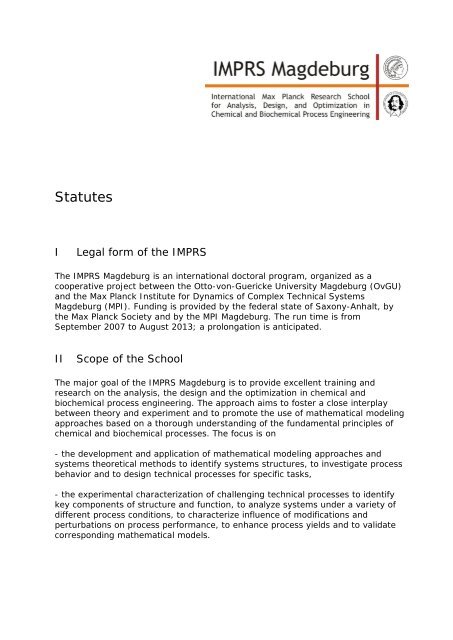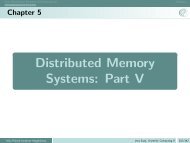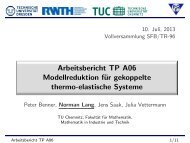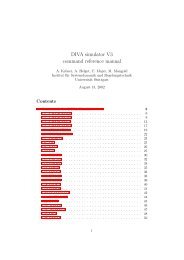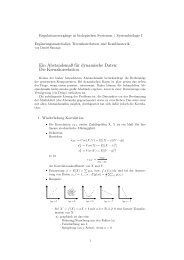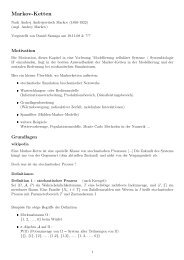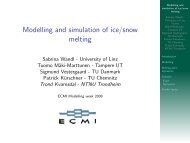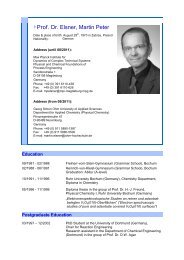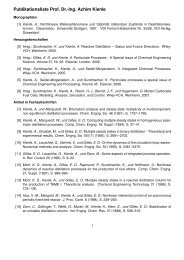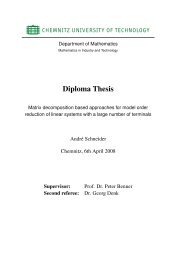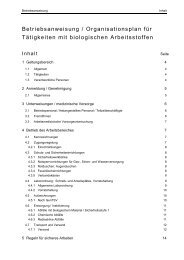Statutes IMPRS - Max Planck Institute for Dynamics of Complex ...
Statutes IMPRS - Max Planck Institute for Dynamics of Complex ...
Statutes IMPRS - Max Planck Institute for Dynamics of Complex ...
Create successful ePaper yourself
Turn your PDF publications into a flip-book with our unique Google optimized e-Paper software.
<strong>Statutes</strong><br />
I Legal <strong>for</strong>m <strong>of</strong> the <strong>IMPRS</strong><br />
The <strong>IMPRS</strong> Magdeburg is an international doctoral program, organized as a<br />
cooperative project between the Otto-von-Guericke University Magdeburg (OvGU)<br />
and the <strong>Max</strong> <strong>Planck</strong> <strong>Institute</strong> <strong>for</strong> <strong>Dynamics</strong> <strong>of</strong> <strong>Complex</strong> Technical Systems<br />
Magdeburg (MPI). Funding is provided by the federal state <strong>of</strong> Saxony-Anhalt, by<br />
the <strong>Max</strong> <strong>Planck</strong> Society and by the MPI Magdeburg. The run time is from<br />
September 2007 to August 2013; a prolongation is anticipated.<br />
II Scope <strong>of</strong> the School<br />
The major goal <strong>of</strong> the <strong>IMPRS</strong> Magdeburg is to provide excellent training and<br />
research on the analysis, the design and the optimization in chemical and<br />
biochemical process engineering. The approach aims to foster a close interplay<br />
between theory and experiment and to promote the use <strong>of</strong> mathematical modeling<br />
approaches based on a thorough understanding <strong>of</strong> the fundamental principles <strong>of</strong><br />
chemical and biochemical processes. The focus is on<br />
- the development and application <strong>of</strong> mathematical modeling approaches and<br />
systems theoretical methods to identify systems structures, to investigate process<br />
behavior and to design technical processes <strong>for</strong> specific tasks,<br />
- the experimental characterization <strong>of</strong> challenging technical processes to identify<br />
key components <strong>of</strong> structure and function, to analyze systems under a variety <strong>of</strong><br />
different process conditions, to characterize influence <strong>of</strong> modifications and<br />
perturbations on process per<strong>for</strong>mance, to enhance process yields and to validate<br />
corresponding mathematical models.
III Organizational Structure <strong>of</strong> the School<br />
The <strong>IMPRS</strong> is managed by a spokesperson, who is the primary contact person<br />
representing the <strong>IMPRS</strong>. The spokesperson and its representative will be elected <strong>for</strong><br />
a period <strong>of</strong> three years by the participating partners and the representative <strong>of</strong> the<br />
doctoral students.<br />
The coordinator supports the spokesperson in managing the <strong>IMPRS</strong>, coordinates<br />
teaching and helps to organize announcements, selection <strong>of</strong> candidates, lectures,<br />
talks, seminars and workshops. Additionally, the coordinator supports the school’s<br />
students in organizational matters.<br />
Doctoral students will elect one representative <strong>for</strong> a period <strong>of</strong> one year into the<br />
<strong>IMPRS</strong> Board to facilitate communication between the students and the board. This<br />
way, pr<strong>of</strong>icient communication structures are established to take students interests<br />
into account and to join ef<strong>for</strong>ts in improving and ensuring the efficiency <strong>of</strong> the<br />
<strong>IMPRS</strong>.<br />
The spokesperson and its representative, the representative <strong>of</strong> the students and<br />
the participating partners are members <strong>of</strong> the <strong>IMPRS</strong> Board. The board is<br />
responsible <strong>for</strong> the selection <strong>of</strong> candidates, issues concerning inter-institutional<br />
collaboration, assignment <strong>of</strong> resources and scientific questions, in particular the<br />
curriculum <strong>of</strong> the research school. Meetings are held at least on a bi-monthly basis.<br />
New partners can be invited to participate in the <strong>IMPRS</strong>. The actual members <strong>of</strong> the<br />
board may suggest suitable persons, the board will decide about their participation.<br />
<strong>IMPRS</strong> Board<br />
Spokesperson<br />
Pr<strong>of</strong>. Dr.-Ing. Udo Reichl, MPI / OvGU<br />
(FVST)<br />
Coordinator<br />
Dr. Jürgen Koch, MPI<br />
Vice-Spokesperson<br />
Pr<strong>of</strong>. Dr. Gerald Warnecke, OvGU<br />
(FMA)<br />
Student Representatives<br />
Mary Ann Blätke, OvGU (FNW)<br />
Wenjing Wang, MPI<br />
Board Members:<br />
Pr<strong>of</strong>. Dr. Peter Benner, MPI / OvGU (FMA)<br />
Pr<strong>of</strong>. Dr.-Ing. Rolf Findeisen, OvGU (FEIT)<br />
Pr<strong>of</strong>. Dr. Dietrich Flockerzi, MPI<br />
Pr<strong>of</strong>. Dr. Volker Kaibel, OvGU (FMA)<br />
Pr<strong>of</strong>. Dr.-Ing. Achim Kienle, MPI / OvGU (FEIT)<br />
Jun.-Pr<strong>of</strong>. Dr.-Ing. Ulrike Krewer, MPI / OvGU (FVST)<br />
Pr<strong>of</strong>. Dr. Wolfgang Marwan, OvGU (FNW)<br />
Dr. Jörg Schaber, OvGU (FME)<br />
Pr<strong>of</strong>. Dr. Sebastian Sager, OvGU (IMO)<br />
Pr<strong>of</strong>. Dr.-Ing. Andreas Seidel-Morgenstern, MPI / OvGU (FVST)<br />
Dr. Matthias Stein, MPI<br />
PD Dr. Ronny Straube, MPI<br />
Pr<strong>of</strong>. Dr.-Ing. Kai Sundmacher, MPI / OvGU (FVST)<br />
Pr<strong>of</strong>. Dr.-Ing. Dominique Thévenin, OvGU (FVST)<br />
<strong>Statutes</strong> <strong>IMPRS</strong> Magdeburg Page 2 Version 7.1, November 2012
IV Supervision <strong>of</strong> doctoral students<br />
PhD advisory committees (PACs) will be established to support doctoral students in<br />
selecting appropriate lectures, seminars and courses, and to monitor and discuss<br />
the status <strong>of</strong> their thesis. Due to the interdisciplinary nature <strong>of</strong> the program the<br />
members <strong>of</strong> each PAC usually cover theoretical as well as experimental aspects <strong>of</strong><br />
the work. Each student has an individual PAC that consists <strong>of</strong> at least 3 persons:<br />
• the main advisor, representing the main subject<br />
• the co-advisor, representing a second, complementary discipline and<br />
• the mentor, an experienced scientist at post-doc-level that is closely<br />
cooperating with the candidate and usually available at short notice.<br />
In particular, the members <strong>of</strong> the PACs will assist students in selecting basic and<br />
advanced courses required to broaden their knowledge in systems theory,<br />
mathematical modeling and engineering sciences as well as to effectively pursue<br />
world-class research in their specific field <strong>of</strong> interest. Theses should be finished<br />
within three years.<br />
Basic guidelines <strong>for</strong> the PAC meetings:<br />
o The members <strong>of</strong> the PAC should be fixed within the first 6 months after the<br />
doctoral candidate started his project.<br />
o The candidate should have meetings at regular intervals with all members <strong>of</strong><br />
the PAC, preferably as a whole group, approx. every 6 months.<br />
o The candidate is encouraged to write a report in order to prepare <strong>for</strong> the<br />
meeting<br />
o Issues to be addressed within the PAC meetings:<br />
• results <strong>of</strong> the project<br />
• first steps / next steps within the project<br />
• problems / setbacks encountered and possible solutions<br />
• lectures and courses to be taken<br />
• conferences attended / upcoming conferences<br />
• publications in preparation / already published<br />
<strong>Statutes</strong> <strong>IMPRS</strong> Magdeburg Page 3 Version 7.1, November 2012
V Curriculum<br />
All lectures, courses, seminars and workshops <strong>of</strong> the <strong>IMPRS</strong> will be held in English.<br />
Details on the structure and the <strong>for</strong>mal details <strong>of</strong> the thesis are listed in the<br />
regulations <strong>for</strong> a doctor degree (“Promotionsordnung”) <strong>of</strong> the corresponding faculty<br />
<strong>of</strong> the OvGU. Foreign students are entitled to apply <strong>for</strong> a mutual doctoral thesis in<br />
case a contract with a collaborating faculty <strong>of</strong> a partner university exists.<br />
The program is structured into introductory course, core curriculum, and advanced<br />
and specialized courses. The introductory course will be presented be<strong>for</strong>e the start<br />
<strong>of</strong> the semester <strong>for</strong> beginners <strong>of</strong> the doctoral program. The lectures will take place<br />
daily <strong>for</strong> two weeks. Its primary goal is to explain the structure <strong>of</strong> the <strong>IMPRS</strong> and to<br />
give an overview on the scientific focus <strong>of</strong> the participating groups. In addition, it<br />
will allow students to get to know each other and to introduce most lecturers.<br />
The core curriculum covers lectures and exercises which are considered essential<br />
<strong>for</strong> the successful participation in the <strong>IMPRS</strong>. These courses are intended to build<br />
up a pr<strong>of</strong>ound scientific knowledge base. Focus <strong>of</strong> the core curriculum is on<br />
lectures, exercises and tutorials that cover mathematical and systems theoretical<br />
tools <strong>for</strong> analyzing, designing and optimizing chemical and biochemical processes.<br />
The level <strong>of</strong> these lectures is at an intermediate level (between Master and<br />
doctorate level) to allow beginners <strong>of</strong> the study program with a different scientific<br />
background to successfully attend these lectures and exercises.<br />
Advanced and specialized lectures are <strong>of</strong>fered to sharpen the student’s individual<br />
scientific focus. All courses are <strong>of</strong>fered at a level beyond Master courses. The<br />
selection <strong>of</strong> courses will be based on recommendations made by the PACs.<br />
Doctoral students are expected to visit all lectures required to fulfill the <strong>IMPRS</strong><br />
curriculum during the first and second year <strong>of</strong> the doctoral program. During the<br />
third year, the focus should be on presentations <strong>of</strong> research results on international<br />
meetings and publications in peer-reviewed journals. Participation <strong>of</strong> the students<br />
in summer schools and conferences that are relevant to their research topics is<br />
strongly encouraged and financially supported. The <strong>IMPRS</strong> Magdeburg will also<br />
organize summer or winter schools on a regular basis.<br />
Students are encouraged to publish their research results in refereed journals<br />
already during their time as a doctoral student. They should have 1-2 publications<br />
in peer-reviewed journals accepted <strong>for</strong> print be<strong>for</strong>e finishing their thesis. All<br />
publications, including posters and talks, are listed in the MPS bibliographic<br />
database eDoc (www.edoc.mpg.de)<br />
A regular <strong>IMPRS</strong> Seminar takes place every two weeks, with presentations <strong>of</strong><br />
recent research results <strong>of</strong> the <strong>IMPRS</strong> students. Additionally, a 2-3 days workshop<br />
will take place every year. Participation is mandatory <strong>for</strong> the <strong>IMPRS</strong> students in<br />
both the seminar and the workshop.<br />
All students <strong>of</strong> the <strong>IMPRS</strong> have to earn 30 Credit Points (CP) according to the list<br />
below; Credit Points are given according to the ECTS (European Credit Transfer and<br />
Accumulation System). After finishing the <strong>IMPRS</strong> and successful defense <strong>of</strong> the<br />
thesis at the faculty, students will receive a 'Promotionsurkunde' from the Otto von<br />
Guericke University Magdeburg and an additional certificate <strong>of</strong> the <strong>IMPRS</strong><br />
Magdeburg. A transcript will document the courses taken.<br />
<strong>Statutes</strong> <strong>IMPRS</strong> Magdeburg Page 4 Version 7.1, November 2012
A doctoral student can earn up to 5 CP <strong>for</strong> own teaching activities (e.g., organizing<br />
the exercises to a lecture)<br />
In case a student has already visited equivalent lectures in his Master or Diploma<br />
study, up to 10 CP can be transferred. The decision about approval will be made by<br />
the lecturer <strong>of</strong> the equivalent lecture upon a request (in written <strong>for</strong>m) <strong>of</strong> the<br />
candidate. The candidate has to add the module description or a script <strong>of</strong> the<br />
lecture to the request.<br />
The membership <strong>of</strong> a doctorate student in the <strong>IMPRS</strong> Magdeburg normally ends<br />
with the thesis defense, or if the student discontinues his doctorate.<br />
Credits<br />
20 CP <strong>for</strong> lectures <strong>of</strong> the core curriculum, the advanced<br />
courses or other relevant lectures;<br />
up to 5 CP <strong>for</strong> own teaching activities<br />
3 CP courses on scientific skills, e.g.:<br />
• scientific writing<br />
• project management<br />
• in<strong>for</strong>mation literacy<br />
• presenting pr<strong>of</strong>essionally<br />
1 seminar = 1 CP<br />
3 CP presentation at the <strong>IMPRS</strong> seminar / workshop<br />
1 talk = 1 CP<br />
active participation in a conference = 1 CP<br />
4 CP participation in a summer or winter school<br />
Σ 30 CP<br />
1 school = 4 CP<br />
<strong>Statutes</strong> <strong>IMPRS</strong> Magdeburg Page 5 Version 7.1, November 2012
VI Conferral <strong>of</strong> a Doctorate<br />
The doctor degree is earned at one <strong>of</strong> the four faculties involved in the <strong>IMPRS</strong>:<br />
• Faculty <strong>of</strong> Process and Systems Engineering (FVST)<br />
• Faculty <strong>of</strong> Electrical Engineering and In<strong>for</strong>mation Technology (FEIT)<br />
• Faculty <strong>of</strong> Mathematics (FMA)<br />
• Faculty <strong>of</strong> Natural Sciences (FNW)<br />
Doctorate Regulations <strong>of</strong> the OvG university (in German)<br />
http://www.unimagdeburg.de/verwaltung/verwaltungshandbuch/promotionsordnungen.htm<br />
Doctorate Regulations <strong>of</strong> the Faculty <strong>of</strong> Process and Systems Engineering<br />
(Englisch, only <strong>for</strong> internal use)<br />
http://www.mpimagdeburg.mpg.de/imprs/About/FVST_Promotionsordnung_engl.pdf<br />
The theses will be reviewed by at least two pr<strong>of</strong>essors, according to the doctorate<br />
regulations. It is desirable to have an external reviewer.<br />
VII Extracurricular Activities<br />
German classes are <strong>of</strong>fered at different levels to facilitate daily life <strong>for</strong> students<br />
coming from abroad. Social events are organized by the coordinator and the<br />
students themselves to improve team working.<br />
<strong>Statutes</strong> <strong>IMPRS</strong> Magdeburg Page 6 Version 7.1, November 2012
VIII Participating Research Groups<br />
Spokesperson<br />
Pr<strong>of</strong>. Dr.-Ing. Udo Reichl<br />
Chair <strong>of</strong> Bioprocess Engineering, <strong>Institute</strong> <strong>of</strong> Process Engineering, OvGU<br />
Head <strong>of</strong> the Research Group Bioprocess Engineering, MPI Magdeburg<br />
Vice Spokesperson<br />
Pr<strong>of</strong>. Dr. Gerald Warnecke<br />
Chair <strong>of</strong> Numerical Mathematics, <strong>Institute</strong> <strong>of</strong> Analysis and Numerical<br />
Mathematics, OvGU<br />
Pr<strong>of</strong>. Dr. Peter Benner,<br />
Computational Methods in Systems and Control Theory, MPI Magdeburg<br />
Pr<strong>of</strong>. Dr.-Ing. Rolf Findeisen<br />
Chair <strong>of</strong> Systems Theory and Automatic Control, <strong>Institute</strong> <strong>of</strong> Automation, OvGU<br />
Pr<strong>of</strong>. Dr. Dietrich Flockerzi<br />
Research Group Systems and Control Theory, MPI Magdeburg<br />
Pr<strong>of</strong>. Dr. Volker Kaibel<br />
Chair <strong>of</strong> Mathematical Optimization, <strong>Institute</strong> <strong>for</strong> Mathematical Optimization, OvGU<br />
Pr<strong>of</strong>. Dr.-Ing. Achim Kienle<br />
Chair <strong>of</strong> Automation Technique and Modeling, <strong>Institute</strong> <strong>of</strong> Automation, OvGU<br />
Head <strong>of</strong> the Research Group Process Synthesis and Process <strong>Dynamics</strong>, MPI<br />
Magdeburg<br />
Jun.-Pr<strong>of</strong>. Dr.-Ing. Ulrike Krewer<br />
Otto Hahn Group Portable Energy Systems, MPI Magdeburg<br />
Pr<strong>of</strong>. Dr. Wolfgang Marwan<br />
Chair <strong>of</strong> Regulatory Biology, <strong>Institute</strong> <strong>of</strong> Biology, OvGU<br />
Dr. Jörg Schaber,<br />
<strong>Institute</strong> <strong>of</strong> Experimental Internal Medicine, OvGU<br />
Pr<strong>of</strong>. Dr.-Ing. Andreas Seidel-Morgenstern<br />
Chair <strong>of</strong> Chemical Process Engineering, <strong>Institute</strong> <strong>of</strong> Process Engineering, OvGU<br />
Head <strong>of</strong> the Research Group Physical and Chemical Foundations <strong>of</strong> Process<br />
Engineering, MPI Magdeburg<br />
PD Dr. Ronny Straube,<br />
Research Group Systems Biology, MPI Magdeburg<br />
Pr<strong>of</strong>. Dr.-Ing. Kai Sundmacher<br />
Chair <strong>of</strong> Process Systems Engineering, <strong>Institute</strong> <strong>of</strong> Process Engineering, OvGU<br />
Head <strong>of</strong> the Research Group Physical and Chemical Process Engineering, MPI<br />
Magdeburg<br />
Pr<strong>of</strong>. Dr.-Ing. Dominique Thévenin<br />
Chair <strong>of</strong> Fluid <strong>Dynamics</strong> & Technical Flows, <strong>Institute</strong> <strong>of</strong> Fluid <strong>Dynamics</strong> &<br />
Thermodynamics, OvGU<br />
<strong>Statutes</strong> <strong>IMPRS</strong> Magdeburg Page 7 Version 7.1, November 2012
Protocol <strong>of</strong> the PAC Meeting<br />
Winter Term / Summer Term 20 _ _<br />
Candidate, signature__________________________________________________<br />
Main Advisor,<br />
signature________________________________________________<br />
Co-Advisor, signature<br />
_________________________________________________<br />
Mentor, signature ____________________________________________________<br />
Issues to be addressed within the PAC meeting:<br />
• results <strong>of</strong> the project<br />
_______________________________________________________<br />
_______________________________________________________<br />
• first steps / next steps within the project<br />
_______________________________________________________<br />
_______________________________________________________<br />
• problems / setbacks encountered and possible solutions<br />
_______________________________________________________<br />
_______________________________________________________<br />
• lectures and courses to be taken<br />
_______________________________________________________<br />
_______________________________________________________<br />
• conferences attended / upcoming conferences<br />
_______________________________________________________<br />
_______________________________________________________<br />
• publications in preparation / already published<br />
_______________________________________________________<br />
_______________________________________________________<br />
<strong>Statutes</strong> <strong>IMPRS</strong> Magdeburg Page 8 Version 7.1, November 2012


